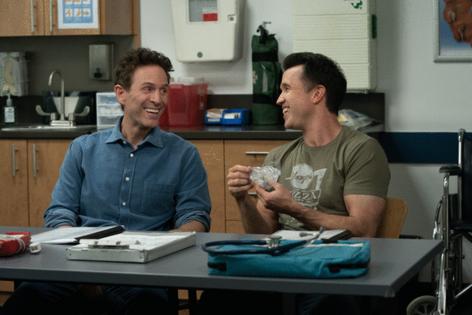Commentary: After 20 years, how is 'It's Always Sunny' still always funny?
Published in Entertainment News
Given how much our cultural relationship with narcissism has changed in the past 20 years, it’s mind-blowing that a TV show about five horrific narcissists has stayed on the air for two decades. But that’s just what happened with “It’s Always Sunny in Philadelphia,” which debuted on FX in August 2005 and kicked off its 17th season earlier this month on FXX.
The Gang, as these five degenerates are known — twins Dee (Kaitlin Olson) and Dennis (Glenn Howerton) and their dad Frank (Danny DeVito), with friends Charlie (Charlie Day) and Mac (Rob McElhenney, who is currently rebranding himself as Rob Mac, which is, frankly, a very Mac move) — are a kind of dysfunctional family that runs Philly dive bar Paddy’s Pub and sows chaos with their constant scheming.
How has a crude comedy about five awful humans withstood the wild cultural swings of the past 20 years, and somehow gotten even funnier along the way? It’s a very smart show, even though it’s about people who are both dumb and completely divorced from standard modern morality. But for my money, a crucial element to Sunny’s" continued success comes from its connection to reality.
"It's Always Sunny” doesn’t exist in a TV bubble; it exists in the real world so its characters can acknowledge current events and cultural shifts on the show’s own terms, without compromising its point of view or the taboo humor that’s its stock in trade. (Many sitcoms do not, and it was pretty awkward when “Brooklyn Nine-Nine,” a very funny cop sitcom that didn’t interact much with the real world, had to deal with the fact that public sentiment about police tanked during the height of the “defund the police” movement.)
Here are a few episode titles from the show’s first season: “The Gang Gets Racist,” “Charlie Wants an Abortion,” “Underage Drinking: A National Concern” and “Gun Fever.”
It’s hard to imagine that show getting much traction if it launched today, but in the 2000s, America’s cultural appetite for meanness was pretty high. Tabloid culture was all about celebrity ridicule, Perez Hilton’s cruel gossip blog launched in 2004, and reality TV shows like “Bridezillas,” “The Apprentice” and “Hell’s Kitchen,” which was about Gordon Ramsay screaming, followed soon after.
In this environment, a plotline in which the gang casually persuades a priest to abandon the church and leaves him a desperate drug addict (but, you know, in a funny way) seems pretty normal.
But that cruelty didn’t last forever (thank goodness). For pop-culture obsessives of the 2000s, the subsequent shifts from that era’s main characters feel genuinely shocking. Perez Hilton has apologized! Gordon Ramsay became nice! The world fell in love with “The Great British Bake Off” because everyone is so lovely and kind to their fellow contestants, and we’ve collectively decided that this vibe is the best.
And yet the Gang continues to be the worst. No matter how much we, as a culture, learn about issues like racism and misogyny, homophobia and transphobia, the gang will not learn. They’re unrepentant, unaware scumbags who only do the right thing for the wrong reasons, but at least they’re so comically vile there’s no mistaking the show as endorsing their choices.
So why has it lasted so long?
Well, the cast is funny. I’ve never really been one for gross-out humor, but Dee’s gag reflex remains one of the funniest bits of physical comedy I’ve ever seen. I’ve never really been one for cringe humor, but I can’t watch Charlie’s musical “The Nightman Cometh,” a deeply uncomfortable love story featuring an adult woman and a baby boy, a troll and an ersatz ninja, without borderline hyperventilating with laughter.
In Alan Sepinwall’s excellent appreciation of the show for Rolling Stone, he mentioned that the show’s short seasons have helped with longevity. In its first 16 seasons, “It’s Always Sunny” released 170 episodes; “Seinfeld,” by way of contrast, aired 180 episodes during its nine-season run. So “Sunny” stars can grow their careers without leaving the show behind.
But why do we still like it, when our appetite for mean humor has otherwise diminished?
Sure, they’re always getting up to their unique brand of chaos — accidentally eating human meat or smoking angel dust, getting wasted for an intervention, Charlie’s obsession with bird law and Mac’s karate fetish — but they’ve also tried to exploit culture and pop-culture phenomena like the mortgage crisis, the podcast craze, the child-beauty-pageant world, multilevel marketing schemes and the Jan. 6 riot, to name just a few. Frank was on Jeffrey Epstein’s island, but only for the snorkeling. The gang went MAGA, but it turned out they were all just big fans of Kanye West. Dennis accidentally becomes woke because he wants to date younger women, all of whom demand political engagement in partners.
From Dennis’ anger at our app-based world to the very real complexities of COVID, vaccination debate and identity politics, the Gang ask the questions floating in the zeitgeist, good and bad, and make every mistake a viewer could ever make (and many mistakes we would never ever ever make, ever, not in a million years).
The stakes don’t always have to be politically sky-high. In the current season, now airing, there’s a reference to the baking show “Is It Cake?” that made me spit take. I’ve also had moving experiences — like when Mac comes out as gay to his father using dance — because over time these characters have become as complex as they are awful.
You don’t have to jump the shark when you’re pulling from the richest vein of stranger-than-fiction stories imaginable, particularly when you have the ingenious “Sunny” writers on your side.
———
(Gemma Wilson is The Seattle Times arts and culture writer.)
———
© 2025 The Seattle Times. Visit www.seattletimes.com. Distributed by Tribune Content Agency, LLC.













Comments